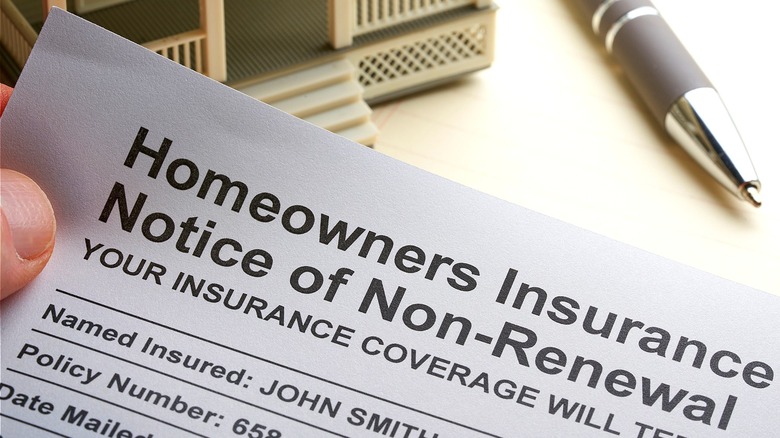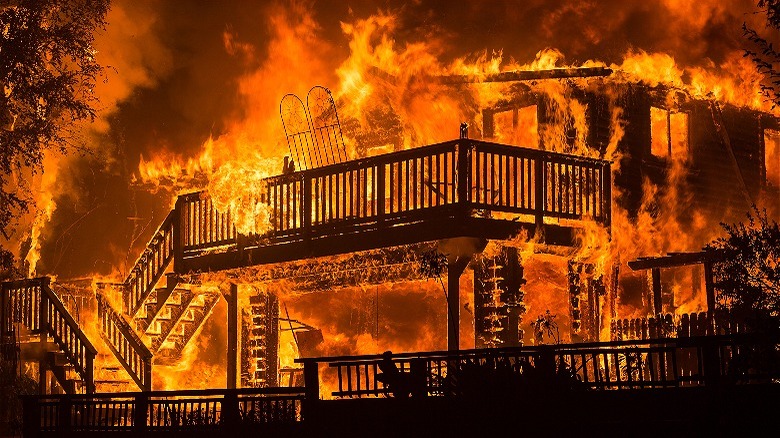Top Things Insurance Companies Don't Want To Cover Anymore
From health to car to home, the insurance world can feel overwhelming as a consumer (especially when you consider how many unnecessary insurance products exist). From navigating workplace- based policies to following regional laws about mandatory insurance coverage to ensuring that you adhere to mortgage-specific requirements, it's no wonder more and more people today report being dissatisfied with their insurance providers. To make matters worse, as insurance companies continue to value profits over their original purpose of financially protecting consumers against a potential emergency, consumers are left with little to no recourse.
Increasingly, insurance companies have come to realize they can collect monthly payments from consumers and avoid ever having to actually pay out on policies by simply canceling (or failing to renew) consumer insurance plans. In fact, mass policy cancellations and nonrenewals have happened across the country in recent years, and it has left millions of Americans without other insurance options. For homeownership, this is increasingly true for those who live in higher-risk areas.
For example, Tasha Carter, Florida's Insurance Consumer Advocate, explained to Bankrate the situation Florida residents are facing, specifically, "As hurricanes become stronger, the severity and frequency of claims may increase, resulting in higher claim payouts. As a result of these factors, insurance companies are taking steps to mitigate their risk and reduce their exposure by increasing insurance rates and refusing to insure certain homes." As insurance companies find new ways to cancel a myriad of insurance-policy types each year, let's break down the two insurance types companies are most likely to cancel or fail to offer in the future.
Pet insurance
While you might still wonder if pet insurance is really worth the cost, as the number of American households with pets increases (up 56% since 1986, per Forbes), so, too, does the prevalence of pet insurance. Pet insurance has experienced a 26.6% growth rate since 2018. This said, even with its impressive growth, pet insurance is still relatively small in scale when compared to other insurance types (according to Forbes, only ~4% of all dogs in the country have insurance). However, a further complication in the growth and popularity of pet insurance is the recent large-scale pet insurance policy cancellations that have negatively impacted pet owners across the country. Most notably, in June 2024, popular insurance provider Nationwide dropped a whopping 100,000 pet policies.
While Nationwide claimed in a statement the reason for its mass policy cancellation was due to the rising costs of veterinary care (among other factors), which ultimately were cutting into its profits, the truth could be even more complicated. The company using profits as its primary motivation for cancellation is already problematic (especially for loyal customers who were paying high monthly premiums for their policies) but some suggest Nationwide specifically canceled policies for elderly pets with preexisting conditions. By canceling insurance for these specific pets, Nationwide could ensure it wouldn't have to pay out for the additional medical care that aging pets tend to require. The worst part is that many of these pets will be unable to get insurance policies from other providers, due to their preexisting conditions.
Homeowners insurance
A surprise to no one, homeowners insurance is facing the highest cancellation rates, especially as climate change creates more extreme weather conditions across the U.S. (turns out natural disasters affect more than just the stock market). Some homeowners are already facing higher premiums as well as an increased chance of cancellation or nonrenewal than others, depending on the state they live in. Allstate, State Farm, and American National have all left and/or dropped homeowner policies in California largely stemming from increases in wildfires. Even worse, as California works to add more consumer protections to limit insurance price increases, some insurers are choosing to instead leave the state altogether rather than minimize their gouging. Similarly, thousands of homeowners in Florida and Virginia are facing policy cancellations and nonrenewals at the same time the National Oceanic and Atmospheric Administration has predicted an above-normal 2024 Atlantic hurricane season.
The lack of available and affordable homeowners insurance puts more and more Americans at risk. Per a 2024 Consumer Federation of America study, one in 13 American homeowners are uninsured (about 7.4%), living in about 6.1 million homes valued at $1.6 trillion. Even more concerning is that the lack of homeowners insurance disproportionately affects both low-income families and people of color. Homeowners with an annual salary under $50,000 were twice as likely to lack homeowners insurance while 22% of Native American, 14% of Hispanic, and 11% of Black homeowners didn't have homeowners insurance (compared to 6% of white homeowners).


